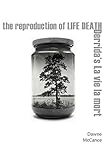The Reproduction of Life Death : Derrida's La vie la mort / Dawne McCance.
Material type: TextPublisher: New York, NY : Fordham University Press, [2019]Copyright date: ©2019Description: 1 online resource (224 p.) : 4Content type:
TextPublisher: New York, NY : Fordham University Press, [2019]Copyright date: ©2019Description: 1 online resource (224 p.) : 4Content type: - 9780823283910
- 9780823283934
- 194 23
- online - DeGruyter
- Issued also in print.
| Item type | Current library | Call number | URL | Status | Notes | Barcode | |
|---|---|---|---|---|---|---|---|
 eBook
eBook
|
Biblioteca "Angelicum" Pont. Univ. S.Tommaso d'Aquino Nuvola online | online - DeGruyter (Browse shelf(Opens below)) | Online access | Not for loan (Accesso limitato) | Accesso per gli utenti autorizzati / Access for authorized users | (dgr)9780823283934 |
Browsing Biblioteca "Angelicum" Pont. Univ. S.Tommaso d'Aquino shelves, Shelving location: Nuvola online Close shelf browser (Hides shelf browser)

|

|

|

|

|

|

|
||
| online - DeGruyter Murderous Consent : On the Accommodation of Violent Death / | online - DeGruyter Administering Interpretation : Derrida, Agamben, and the Political Theology of Law / | online - DeGruyter Unknowing Fanaticism : Reformation Literatures of Self-Annihilation / | online - DeGruyter The Reproduction of Life Death : Derrida's La vie la mort / | online - DeGruyter Jewish Studies as Counterlife : A Report to the Academy / | online - DeGruyter Thinking with Adorno : The Uncoercive Gaze / | online - DeGruyter A Theology of Failure : Žižek against Christian Innocence / |
Frontmatter -- Contents -- Abbreviations of Works by Jacques Derrida -- Introduction -- 1. Double Helix -- 2. Schools of Life -- 3. Institutions of the "Yes" -- 4. Speaking into a Dead Man's Ear -- 5. Life Worth More Than Life -- 6. The Movement of a Pas -- 7. Rhythmos -- Acknowledgments -- Notes -- Works Cited -- Index -- About the Author
restricted access online access with authorization star
http://purl.org/coar/access_right/c_16ec
During the 1975-76 academic year, Jacques Derrida delivered a seminar, La vie la mort (Life Death), at the École normale supérieure, in Paris. Based on archival translations of this untapped but soon-to-be-published seminar, The Reproduction of Life Death offers an unprecedented study of Derrida's engagement with molecular biology and genetics, particularly the work of the biologist François Jacob.Structured as an itinerary of "three rings," each departing from and coming back to Nietzsche, Derrida's seminar ties Jacob's logocentric account of reproduction to the reproductive program of teaching that characterizes the academic institution, challenging this mode of teaching as auto-reproduction along with the concept of "academic freedom" on which it is based. McCance also brings Derrida's critique of Jacob's theory of auto-reproduction together with his reading of reproductivity, the tendency to repeat-reproduce, that is theorized and enacted in Freud's Beyond the Pleasure Principle. The book further shows how Derrida's account of life death relates to his writings on autobiography and the signature and to such later concerns as the question of the animal.McCance brings extensive archival research together with a deep knowledge of Derrida's work a background in genetics to offer a fascinating new account of an encounter between philosophy and the hard sciences that will be of interest to theorists in a wide range of disciplines concerned with the question of life.
Issued also in print.
Mode of access: Internet via World Wide Web.
In English.
Description based on online resource; title from PDF title page (publisher's Web site, viewed 02. Mrz 2022)


